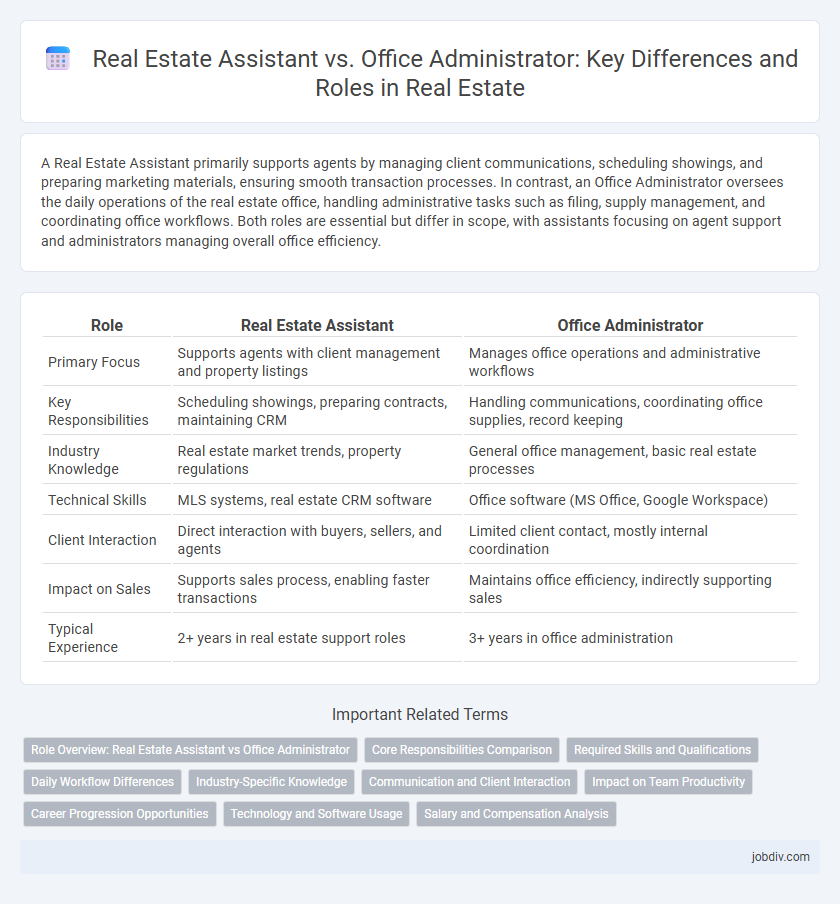A Real Estate Assistant primarily supports agents by managing client communications, scheduling showings, and preparing marketing materials, ensuring smooth transaction processes. In contrast, an Office Administrator oversees the daily operations of the real estate office, handling administrative tasks such as filing, supply management, and coordinating office workflows. Both roles are essential but differ in scope, with assistants focusing on agent support and administrators managing overall office efficiency.
Table of Comparison
| Role | Real Estate Assistant | Office Administrator |
|---|---|---|
| Primary Focus | Supports agents with client management and property listings | Manages office operations and administrative workflows |
| Key Responsibilities | Scheduling showings, preparing contracts, maintaining CRM | Handling communications, coordinating office supplies, record keeping |
| Industry Knowledge | Real estate market trends, property regulations | General office management, basic real estate processes |
| Technical Skills | MLS systems, real estate CRM software | Office software (MS Office, Google Workspace) |
| Client Interaction | Direct interaction with buyers, sellers, and agents | Limited client contact, mostly internal coordination |
| Impact on Sales | Supports sales process, enabling faster transactions | Maintains office efficiency, indirectly supporting sales |
| Typical Experience | 2+ years in real estate support roles | 3+ years in office administration |
Role Overview: Real Estate Assistant vs Office Administrator
A Real Estate Assistant primarily supports agents by managing listings, coordinating showings, and handling client communications to facilitate property transactions. An Office Administrator oversees overall office operations, including scheduling, record-keeping, and administrative support to ensure smooth workflow within the real estate firm. Both roles contribute to operational efficiency, but the Assistant is client- and transaction-focused while the Administrator manages internal office systems.
Core Responsibilities Comparison
A Real Estate Assistant primarily manages client communications, coordinates property showings, and handles transaction documentation to support agents directly in sales processes. An Office Administrator oversees office operations, including scheduling, managing records, and ensuring compliance with real estate regulations to maintain administrative efficiency. While both roles require organizational skills, the assistant focuses on client-facing tasks, whereas the administrator manages internal office functions.
Required Skills and Qualifications
Real Estate Assistants must possess strong organizational skills, proficiency in CRM software, and a solid understanding of property listings and market trends to support agents effectively. Office Administrators require advanced communication abilities, expertise in office management software, and experience in coordinating day-to-day operations within a real estate office. Both roles demand attention to detail, multitasking capabilities, and a customer service-oriented mindset to ensure smooth business functions and client satisfaction.
Daily Workflow Differences
Real Estate Assistants primarily handle client communications, property listings, appointment scheduling, and transaction coordination, ensuring smooth daily operations for agents. Office Administrators focus on managing office supplies, coordinating staff schedules, maintaining records, and overseeing general office functionality to support the entire real estate team. Workflow differences center on client-facing tasks for assistants versus internal operational duties for administrators.
Industry-Specific Knowledge
A Real Estate Assistant possesses specialized knowledge of property listings, market trends, client interactions, and transaction processes, enabling efficient support in sales and acquisitions. An Office Administrator in real estate manages general office operations, document organization, and communication logistics but typically lacks in-depth industry-specific expertise. Mastery of MLS systems, contract nuances, and real estate regulations distinguishes Real Estate Assistants in handling client and agent needs effectively.
Communication and Client Interaction
Real estate assistants prioritize direct communication with clients, managing inquiries, scheduling appointments, and providing personalized support that enhances client relationships and trust. Office administrators focus on internal communication, coordinating between agents, managing office operations, and ensuring smooth workflow, which indirectly improves client satisfaction. Effective client interaction by real estate assistants drives sales, while office administrators optimize backend processes to support overall team efficiency.
Impact on Team Productivity
A Real Estate Assistant directly supports agents by managing client communications, scheduling, and transaction coordination, significantly enhancing individual agent productivity. An Office Administrator oversees overall office operations, including compliance, vendor management, and administrative support, which creates a structured environment that boosts team efficiency. Together, their roles complement each other, driving higher team productivity through organized workflows and effective resource management.
Career Progression Opportunities
A Real Estate Assistant typically gains hands-on experience with property listings, client interactions, and transaction coordination, which can lead to roles such as Real Estate Agent or Property Manager. An Office Administrator in real estate oversees office operations, compliance, and team support, positioning them for advancement into office management, operations director, or brokerage management roles. Both career paths offer distinct progression opportunities, with assistants focusing on client-facing expertise and administrators advancing through organizational leadership.
Technology and Software Usage
Real Estate Assistants leverage CRM platforms such as Salesforce and property management software like AppFolio to streamline client interactions and transaction tracking. Office Administrators utilize broader office suites, including Microsoft Office 365 and Google Workspace, to manage scheduling, documentation, and internal communications efficiently. Both roles increasingly adopt digital tools like DocuSign and Zoom, but Real Estate Assistants focus more on client-facing technology integration to support sales and marketing efforts.
Salary and Compensation Analysis
Real estate assistants typically earn between $40,000 and $55,000 annually, with compensation packages often including performance bonuses tied to sales milestones. Office administrators in real estate offices generally report salaries ranging from $45,000 to $60,000, benefiting from more stable hourly wages and potential health benefits. Salary variations depend on experience, location, company size, and specific role responsibilities within the real estate sector.
Real Estate Assistant vs Office Administrator Infographic

 jobdiv.com
jobdiv.com